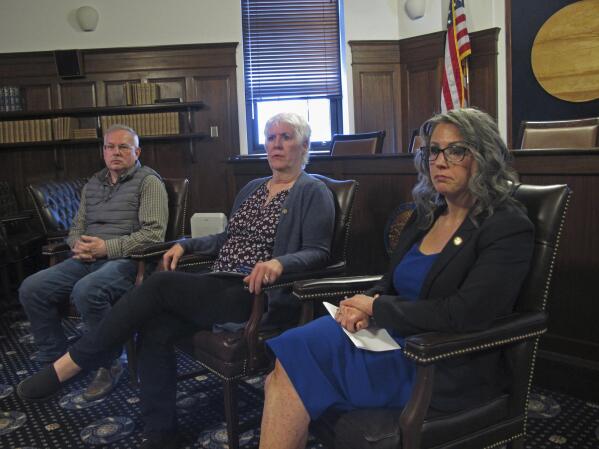Alaska special session limps toward its end, another looms
JUNEAU, Alaska (AP) — The special legislative session limped toward a bitter end Friday, with the threat of a partial government shutdown looming and Alaska Gov. Mike Dunleavy and House majority leaders sharply disagreeing over the adequacy of the budget passed by lawmakers earlier in the week.
Dunleavy called the budget “defective,” pointing in particular to the House’s failure to get the two-thirds support for a procedural effective date vote. His office said notices were sent to thousands of state workers warning of possible layoffs with the new fiscal year beginning July 1.
He called another special session, set to begin Wednesday and focus on the budget, shortly after the House held a brief floor session for which attendance was not mandatory on Friday afternoon. Friday marked the end of a special session that began in May in which the budget also was a main focus.
House majority leaders were among those who criticized Dunleavy’s stance on the budget. House Speaker Louise Stutes characterized it as a needless choice and said Dunleavy has tools available to prevent shutting down parts of the government, including asking minority Republicans to change their votes to support the effective date clause.
Two of the minority’s 18 members — Reps. Bart LeBon and Steve Thompson of Fairbanks — supported the effective date clause during Tuesday’s budget debate in the closely divided, 40-person House.
Dunleavy spokesperson Corey Allen Young said Dunleavy “does not intend to insert himself in the legislative process.”
Minority Republicans, who say they have felt marginalized and want to be included in talks on what pieces should be considered as part of a broader fiscal plan, take responsibility for their votes, House Minority Leader Cathy Tilton told reporters Friday.
“I want to say, the governor is not to blame for this at all. I accept my vote, our caucus accepts their vote. This is a House issue, right now. We want those discussions to move Alaska in the right path,” Rep. Mike Cronk, a Tok Republican, added.
Dunleavy, as part of the special session agenda, wanted lawmakers to consider his proposal for putting in the state constitution a formula for the annual dividend paid to residents. Many lawmakers said they would prefer a more full-fledged debate on the dividend later this year alongside other pieces of a possible fiscal plan. Dunleavy had already called a special session for August on issues like revenue.
But Tilton, a Wasilla Republican, said there are concerns about whether those conversations will take place.
“What we’re really trying to do is help kickstart this process that everybody’s been saying that we need to do,” said Rep. James Kaufman, an Anchorage Republican.
Stutes said prior precedent shows the effective date issue should not shut down government. But Cori Mills, a deputy attorney general, told reporters prior attorney general opinions that have been cited involve circumstances that don’t exactly match the current situation.
“All I can tell you is, based on the facts we have here, I don’t know how you get over violating the constitution,” Mills said.
Under the state constitution, laws become effective 90 days after they are enacted, but the Legislature can provide a different effective date with a two-thirds vote in each chamber. That two-thirds vote failed in the House.
Legislative attorney Megan Wallace, in a memo to Stutes dated Wednesday, said the spending package contains a section making provisions retroactive to their intended effective dates and as such, the executive branch “may choose to give effect to the retroactivity clause, and allow state government to continue operating before the bill takes effect 90 days later.”
Mills has argued the retroactivity clause has no effect until the bill becomes law.
“I think the question that’s presented to the governor is, ‘Should he choose to violate the constitution?’ That’s the choice that’s being put on the governor,” Mills said. “So to act as if this isn’t a big deal, I think, is really undermining our constitution.”




